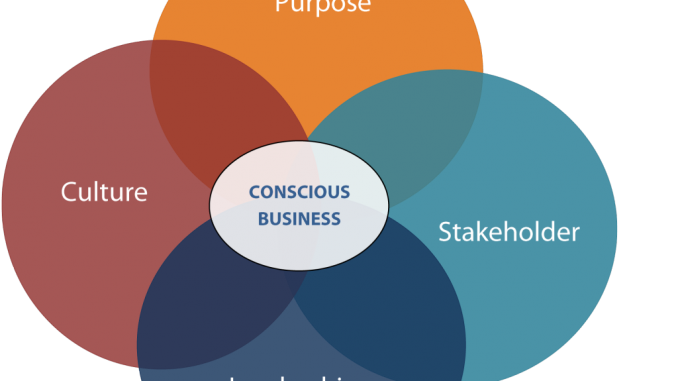
Prof. Dr. Christian Schmidkonz explains what “Conscious Business” is or what it is not and why, in his opinion, this approach must be the business model of the future.
What “Conscious Business” is not
Let me first give examples of “Un-Conscious Business”, i.e. what “Conscious Business” is not. Presently, negative headlines are troubling two icons of Germany’s economy: Volkswagen deceived millions of its customers, thousands of employees and additional millions of people in the “Diesel affair”. The U.S. see public health endangered by the higher exhaust fumes: MIT calculated in a study that in the U.S. alone, 60 to 130 people will die a premature death as a consequence of the fumes. The Deutsche Bank is another candidate in distress. In 2015/ 16, the company will suffer a loss of several billions. In both cases, the crises have been self-made: Greed, ignorance, arrogance and a complete absence of consciousness on the top management level have led to the largest crises in the recent history of both enterprises.
The facts that the top managers responsible for the crises are no longer in their positions and that some of them regularly are summoned before a court illustrate that a completely different approach of entrepreneurial acting and thinking is long overdue, if sustainable success of a company is to be achieved. It is quite amazing how little some companies have learned from the financial crisis in 2008.
“Concious Business”: Alert, conscious and mindful
The mistakes that have led up to these crises would not have happened in a “Conscious Business”. In the U.S. at least, the principles behind this concept have recently gained quite some popularity – also due to the publications by John Mackey und Raj Sisodias on the topic.
In companies where the management and the employees have understood the principles of “Conscious Business” as centerpiece of all entrepreneurial activities, all action is guided by the principles of alertness, consciousness and mindfulness. This approach does not assume that profit-making is an organization’s primary purpose, but aims for sustainable economic success by the uncompromising implementation of the four principles of a “Conscious Business”: Orientation at a higher purpose and the core values, conscious leadership, conscious culture and management, plus the integration of all stakeholders.
 Source: Mackey, John and Raj Sisodia (2014): Conscious Capitalism – Liberating the Heroic Spirit of Business
Source: Mackey, John and Raj Sisodia (2014): Conscious Capitalism – Liberating the Heroic Spirit of Business
Here is a quote from the book The Conscious Capitalist Credo by John Mackey:
“Conscious businesses are galvanized by higher purposes that serve, align, and integrate the interests of all their major stakeholders. Their higher state of consciousness makes visible to them the interdependencies that exist across all stakeholders, allowing them to discover and harvest synergies from situations that otherwise seem replete with trade-offs. They have conscious leaders who are driven by service to the company’s purpose, all the people the business touches and the planet we all share together. Conscious businesses have trusting, authentic, innovative and caring cultures that make working there a source of both personal growth and professional fulfillment. They endeavor to create financial, intellectual, social, cultural, emotional, spiritual, physical and ecological wealth for all their stakeholders.”
“Conscious Companies” are also financially successful
Quite a number of enterprises are already implementing these principles with much success. One example is Southwest Airlines (abbreviation at the stock exchange: “LUV”!). This airline was the one that transported the most passengers within the U.S. in 2014 and has never suffered a loss in any year since its establishment 44 years ago. The company’s founder and former CEO, Herbert D. Kelleher, was even occasionally encountered loading luggage.
Another example is Whole Foods Market. The company was founded in 1980 and, with an annual turnover of approx. 13 billion USD, is the world’s largest ecological super market chain. Its founder and CEO, John Mackey, is presently shaping the “Conscious Business” trend in a game-changing manner. And Fred Kofman, LinkedIn’s “philosopher and vice president” is one of the most important pioneers of the “Conscious Business” concept.
But what about the financial success of these companies that declared it their goal to maximize their value for society as a whole – and not only for the shareholders alone? In his survey “Firms of Endearment”, published as a book, Raj Sisodia and his co-authors prove that “humanistic companies” – as he calls them – are also much more successful financially than the companies listed in the Standard & Poor’s 500 Index (see table). And they only refer to the investors’ profits. Overall societal profit, as they result from environmental awareness, for example, happy employees and long-lasting and particularly stable supplier relationships were not even considered.
Notes:
- Company returns are total returns with dividends reinvested and compounded.
- a: Companies from Firms of Endearment, updated by authors.
- b: Standard & Poor’s index of five hundred U.S. companies
Source: Sisodia, Raj, David Wolfe and Jag Sheth (2014): Firms of Endearment – How World-Class Companies Profit from Passion and Purpose
“Conscious Business”: Added value by more values
“Conscious Companies” place man into the focus of all business activity – man within the company and man in general. In too many cases, this very obvious and self-understood fact (man is and will remain the main player) seems to have been lost over the past decades. Too much emphasis was placed on technical and mechanical qualifications that enable processing tasks within a profitable time frame and in consideration of a limited budget – to achieve a monetary/ material gain in the end.
But in the long run, not one single person will emerge happy from such conditions. The members of “Conscious Business” will think about the higher purpose of their activities, use this as an orientation in their daily work and thus influence their relationships with customers, stakeholders and the world around them. It is about a deeper understanding why companies exist and how they can generate added value by more values. For some companies (refer to above), this implies an extraordinary and urgent change of culture.
Recommended literature and other media:
- Kofman, Fred (2006): Conscious Business – How to Build Value Through Values, Boulder
- Mackey, John and Raj Sisodia (2014): Conscious Capitalism – Liberating the Heroic Spirit of Business, Boston
- Sisodia, Raj, David Wolfe and Jag Sheth (2014): Firms of Endearment – How World-Class Companies Profit from Passion and Purpose, Upper Saddle River
- Video „Lessons in Conscious Business at LinkedIn: Jeff Weiner, Fred Kofman, Soren Gordhamer“, Dialogue on Wisdom 2.0 Conference 2015
The author is responsible for the content and form of this article.

You are interested in economics and want to acquire in-depth business know-how?
Then the international business degrees at Munich Business School (MBS) are just right for you! At MBS you won’t cram dry theory from old textbooks, but learn in a outcome-oriented way and gain valuable practical experience. Convince yourself:
Bachelor’s in International Business
Master’s in International Business
Master’s in International Business I Finance
Master’s in Innovation and Entrepreneurship
Master’s in International Marketing and Brand Management
Master’s in Sports Business and Communication
MBA General Management
Doctor of Business Administration





